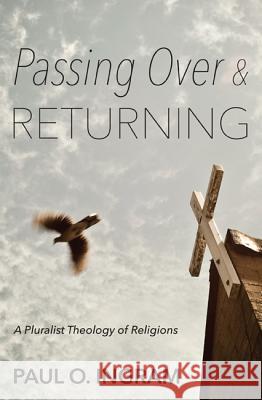Passing Over and Returning: A Pluralist Theology of Religions » książka
Passing Over and Returning: A Pluralist Theology of Religions
ISBN-13: 9781620328132 / Angielski / Miękka / 2013 / 166 str.
Passing Over and Returning: A Pluralist Theology of Religions
ISBN-13: 9781620328132 / Angielski / Miękka / 2013 / 166 str.
(netto: 82,80 VAT: 5%)
Najniższa cena z 30 dni: 87,18
ok. 16-18 dni roboczych.
Darmowa dostawa!
In Passing Over and Returning Paul O. Ingram describes his particular dialogue with the world's religions, illustrated by his experience of passing over into Hinduism, Buddhism, Daoism and Confucianism, Judaism, and Islam, and by his return to his home as a Lutheran Christian. While religious diversity is not new, neither are the questions posed by religious diversity. What is new is that more and more people are actively engaged with the world's religions because more and more people are willing to be informed by insights found in religious traditions other than their own. This is particularly true among progressive Christians. But openness does not necessarily mean rejecting one's own tradition, even though persons sometimes convert to another tradition or combine their original religious identity with the identity of another tradition. Whether one returns to the home of one's own faith tradition after passing over, or assumes a dual religious identity, or converts to another tradition, all persons engaged in interreligious dialogue undergo processes of creative transformation. "This book actualizes what others have pointed toward abstractly. . . . Its commitment to Luther becomes its commitment to the truth that is found beyond Luther, beyond Christianity, and especially in the other great religious traditions. It does not speak abstractly of openness to other traditions, but concretely of what one learns when one crosses over to view reality from specific traditions. And it richly actualizes the return to the Lutheran confession. May this become a model for Christian theologies of the future." --John B. Cobb Jr., Professor Emeritus, Claremont School of Theology "Paul Ingram is in fine form once again. Bold yet nuanced, Ingram grounds his theological reflections directly in theory and sacred text, but the indirect influence of his own passionate journey is also unmistakably present, making this a compelling, challenging, and ultimately rewarding read." --Mark Unno, Head of Religious Studies Department, University of Oregon Paul O. Ingram is Professor Emeritus of History of Religions at Pacific Lutheran University, Tacoma, Washington. He is he author of Buddhist-Christian Dialogue in an Age of Science (2008), The Process of Buddhist-Christian Dialogue (Cascade Books, 2009), and Theological Reflections at the Boundaries (Cascade Books, 2012).
In Passing Over and Returning Paul O. Ingram describes his particular dialogue with the worlds religions, illustrated by his experience of passing over into Hinduism, Buddhism, Daoism and Confucianism, Judaism, and Islam, and by his return to his home as a Lutheran Christian. While religious diversity is not new, neither are the questions posed by religious diversity. What is new is that more and more people are actively engaged with the worlds religions because more and more people are willing to be informed by insights found in religious traditions other than their own. This is particularly true among progressive Christians. But openness does not necessarily mean rejecting ones own tradition, even though persons sometimes convert to another tradition or combine their original religious identity with the identity of another tradition. Whether one returns to the home of ones own faith tradition after passing over, or assumes a dual religious identity, or converts to another tradition, all persons engaged in interreligious dialogue undergo processes of creative transformation."This book actualizes what others have pointed toward abstractly. . . . Its commitment to Luther becomes its commitment to the truth that is found beyond Luther, beyond Christianity, and especially in the other great religious traditions. It does not speak abstractly of openness to other traditions, but concretely of what one learns when one crosses over to view reality from specific traditions. And it richly actualizes the return to the Lutheran confession. May this become a model for Christian theologies of the future."--John B. Cobb Jr., Professor Emeritus, Claremont School of Theology"Paul Ingram is in fine form once again. Bold yet nuanced, Ingram grounds his theological reflections directly in theory and sacred text, but the indirect influence of his own passionate journey is also unmistakably present, making this a compelling, challenging, and ultimately rewarding read."--Mark Unno, Head of Religious Studies Department, University of OregonPaul O. Ingram is Professor Emeritus of History of Religions at Pacific Lutheran University, Tacoma, Washington. He is he author of Buddhist-Christian Dialogue in an Age of Science (2008), The Process of Buddhist-Christian Dialogue (Cascade Books, 2009), and Theological Reflections at the Boundaries (Cascade Books, 2012).











